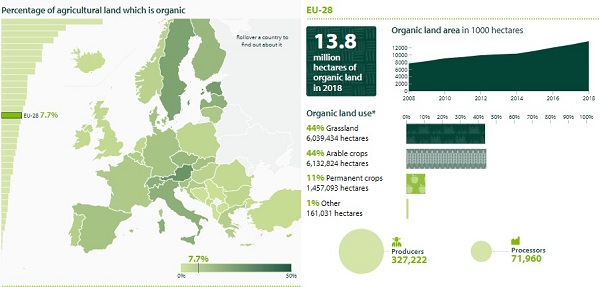IFOAM EU welcomes landmark decision to put organic at the heart of future European food system
Jan Plagge, IFOAM EU President, stated: “Proposing an EU target for organic land is a landmark decision that puts organic farming at the core of a transition of European agriculture towards agroecology. Organic farming is a successful economic model for farmers with proven benefits for the environment. Making it a cornerstone of a future EU sustainable food system is the right decision.” He continued: “We need to transform EU agriculture if we want to address the climate and biodiversity crisis and make our farming systems more resilient. The F2F strategy provides EU citizens with a clear vision for the future of our food system.”
 “However, the objectives of the F2F and EU Biodiversity strategies will only be reachable if they are fully taken into account in the negotiations of the ongoing Common Agricultural Policy (CAP) reform. We must not make the mistake of using Covid-19 as an excuse to continue a backward-looking agricultural policy”, warned Jan Plagge. “This is why the organic movement calls on the European Parliament, the Council and the Commission to fully integrate the objectives of the F2F and Biodiversity strategies into the CAP Strategic Plans Regulation, to raise the level of ambition and make the CAP an effective tool to incentivize and help farmers to transition to agroecological and more sustainable practices. The EU needs a new CAP that rewards farmers for their contribution to public goods such as the preservation of our natural resources.”
“However, the objectives of the F2F and EU Biodiversity strategies will only be reachable if they are fully taken into account in the negotiations of the ongoing Common Agricultural Policy (CAP) reform. We must not make the mistake of using Covid-19 as an excuse to continue a backward-looking agricultural policy”, warned Jan Plagge. “This is why the organic movement calls on the European Parliament, the Council and the Commission to fully integrate the objectives of the F2F and Biodiversity strategies into the CAP Strategic Plans Regulation, to raise the level of ambition and make the CAP an effective tool to incentivize and help farmers to transition to agroecological and more sustainable practices. The EU needs a new CAP that rewards farmers for their contribution to public goods such as the preservation of our natural resources.”
According to IFOAM EU, reaching 25% of organic land in the EU by 2030 is achievable if the CAP provides the necessary remuneration for the benefits of organic conversion and maintenance through existing rural development policies or innovative tools like eco-schemes. Including demand-side measures like promotion schemes and increasing the share of organic products in schools and hospitals through green public procurement is a smart choice as this push-pull approach has proven successful to increase organic farming in countries like Denmark.
IFOAM EU also welcomes the upcoming publication of an ambitious EU action plan for organic farming that will support land conversion, supply chain development, research and innovation and market development. With a reformed CAP, a solid action plan including quantitative time-bound objectives and a dedicated budget will be a good basis to increase organic land and reach the target for 2030.
Background info
The EU’s organic farmland
- Makes up 7.7% of the EU’s total agricultural land
- Increased by one million hectares in the EU (7.6%) between 2017 & 2018
- Is farmed by almost 330,000 organic producers
The EU’s organic market
- Is the second largest single market for organic products
- Is valued at 37.4 billion
- Recorded a growth rate of 7.8% between 2017 & 2018
- On average, an EU citizens consumes €76 of organic food annually
- 71,000 processors process organic food
- 5,000 importers make sure organic food flows in and out of the EU